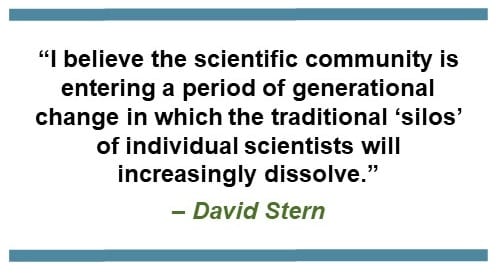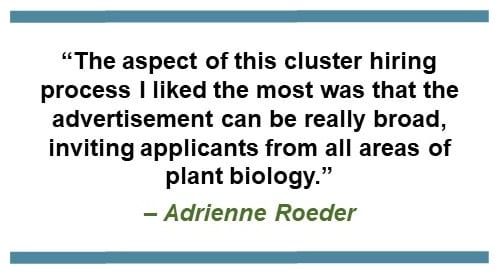News
Cluster Hire Yields Three New Faculty Members

BTI’s most recent faculty hires are, left to right, Magdalena (Magda) Julkowska, Aleksandra (Ola) Skirycz and Andrew Nelson. Photos provided.
Boyce Thompson Institute is pleased to announce the hiring of three faculty members as part of its new and innovative “cluster hire” approach.
Out of 113 applicants, the three people who will join BTI over the next year are:
While each new faculty member brings significant individual scientific expertise, their accomplishments have been enhanced by their propensity and excellent capability for identifying and collaborating with researchers outside of their own disciplines.
This collaborative potential was teased out during the cluster hire process, in which applications were screened on both traditional productivity metrics and applicant statements describing their collaboration experience and philosophy.
 To kick off the process, 13 candidates were invited to BTI for a two-day visit, during which many of them met for the first time. On the first day, candidates gave 15-minute presentations during a symposium, and the second day was reserved for facilitated “speed dating” sessions for rotating groups to brainstorm collaborative research proposals. The results from this exercise were ultimately used to identify the finalists.
To kick off the process, 13 candidates were invited to BTI for a two-day visit, during which many of them met for the first time. On the first day, candidates gave 15-minute presentations during a symposium, and the second day was reserved for facilitated “speed dating” sessions for rotating groups to brainstorm collaborative research proposals. The results from this exercise were ultimately used to identify the finalists.
“It is well known that the innovative scientific discoveries of the future will require interdisciplinary teams in a flexible and adaptable research environment, but hiring processes are not well-suited to identify the necessary personal characteristics,” says BTI President David Stern.
The cluster hire approach was designed to do exactly this, by identifying the elusive mix of exceptional individual abilities and a strong desire to function in a team environment, which Stern says can conflict with the current paradigm for faculty career advancement.
“The reward system for faculty has long focused on an individual’s accomplishments, with less weight placed on discoveries in which they have not clearly played a leadership role. The pressure to excel in a well-defined niche can lead to less risk tolerance and thus make transformative and paradigm-shifting results less probable,” says Stern.
Stern says that in a research institution like BTI, and perhaps in many others, science is going to excel when faculty are encouraged to pool their talents in a fluid and opportunistic manner. “To achieve this goal, we must build both hiring and reward systems that recognize this fact. The cluster hire is the beginning of such a process at BTI,” says Stern.
“Additionally, I believe the scientific community is entering a period of generational change in which the traditional ‘silos’ of individual scientists will increasingly dissolve, not just at BTI but also far beyond our walls,” he notes.
Eric Richards, BTI faculty member and a member of the faculty search committee, agrees that the traditional hiring process might not always yield the best collaborators.
“Traditionally, the hope has been that if you get the best and brightest who shine as individuals, they will become leaders and good collaborators,” says Richards. “The idea with this cluster hire was to start thinking about that networking and collaboration earlier.”
“The concept of a cluster hire is not new, but institutions generally define the clusters prior to the hiring,” says Greg Martin, BTI faculty member and a member of the faculty search committee.
 “What is novel here is we asked the candidates to define what the aims of their cluster will be,” Martin says.
“What is novel here is we asked the candidates to define what the aims of their cluster will be,” Martin says.
Adrienne Roeder, an Associate Professor in the School of Integrative Plant Science (SIPS) at Cornell University and a member of the faculty search committee, liked that the cluster definition was left open to the candidates.
“The aspect of this cluster hiring process I liked the most was that the advertisement can be really broad, inviting applicants from all areas of plant biology,” Roeder says. “That was fantastic because then you get an applicant pool of people who are doing all the most exciting, novel things, not just meeting your preconceived notion of what is interesting.”
There were initially some concerns that this type of cluster hire might not work because it had never been done before, says Mary Lou Guerinot, Chair of BTI’s Scientific Advisory Board and member of BTI’s Board of Directors.
“I’m happy to say that it worked, and I’m very much looking forward to meeting the new faculty,” Guerinot said. She is a Professor in the Department of Biological Sciences at Dartmouth College in Hanover, NH.
“You have to hand it to the applicants: they were risk takers, and I really appreciate that about them,” says Stern.
In addition to their BTI roles, Stern is an Adjunct Professor in SIPS, Martin is a Professor in SIPS, and Richards is an Adjunct Professor in the Department of Molecular Biology and Genetics at Cornell.


